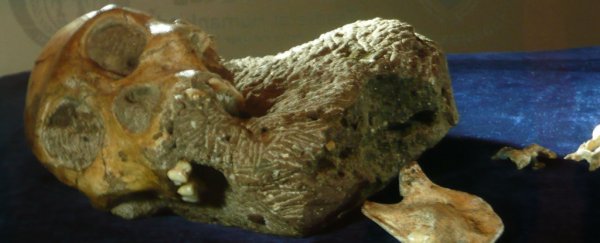The apple doesn't fall far from the tree, as the saying goes. And it seems that could be true of Homo sapiens as a whole. Just as our activities today drive other animals to extinction, so too, new research suggests, did those of human ancestors millions of years ago.
By examining the fossil record in East Africa, biologists have been able to trace a decline in carnivores that correlates with an increase in hominin brain size and vegetation changes - but not with climate or weather changes, as is commonly found.
This, the researchers say, can be interpreted as a connection between hominin activity and carnivore extinctions.
 (Mauricio Antón)
(Mauricio Antón)
"Our analyses show that the best explanation for the extinction of carnivores in East Africa is … that they are caused by direct competition for food with our extinct ancestors," said computational biologist Daniele Silvestro of the University of Gothenburg in Sweden.
East Africa has a rich fossil record of the history of humanity, dating back millions of years. Modern humans - that's us - only emerged about 200,000 years ago, but our (extinct) ancestors and close relatives, such as Australopithecus and Ardipithecus, were around a lot longer.
We know, based on previous research, that hominin brains have tripled in volume in the last 4 million years or so. We also know that sophisticated tool use emerged during this time; it seems reasonable to infer that, as they evolved, hominins were increasing in cunning.
And that they were putting that cunning to good use - by pinching other animals' kills, much to their detriment.
"By investigating the African fossils, we can see a drastic reduction in the number of large carnivores, a decrease that started about 4 million years ago," said palaeontologist Lars Werdelin of the Swedish Museum of Natural History.
"About the same time, our ancestors may have started using a new technology to get food called kleptoparasitism."
You probably know kleptoparasitic animals very well. Seagulls, swooping in to nick your chips. Hyenas and lions, which steal each other's kills willy-nilly. The less said about the poor, displaced Australian white ibis the better.
Even chimpanzees - animals with the same size brain as Australopithecus - have been seen stealing a kill from a leopard.
Kleptoparasitism is a valid survival strategy, often lower risk and lower effort than going out and finding your own food. And, prior to developing hunting tools, it's plausible that hominins made use of it.
If you steal someone else's food often enough, the researchers reasoned, then they're eventually going to die. That could start the cascade towards extinction. Later, as hominins started becoming more effective hunters of herbivores, that could decrease food availability for carnivores.
And, as humans developed more sophisticated tools and a longer hunting range, that would further increase pressure on the carnivores. And, of course, all these advances would help populations grow, which would increase the overall amount of food required to support the communities.
Based on the extinctions the researchers found, the effect wasn't nearly as severe as it is today. But the researchers believe their work shows that the effect those ancient ancestors had on the world was detrimental to other creatures.
"Monopolisation of resources is a skill we and our ancestors have had for millions of years," said evolutionary biologist Søren Faurby of the University of Gothernburg, "but only now are we able to understand and change our behaviour and strive for a sustainable future."
The research has been published in Ecology Letters.
